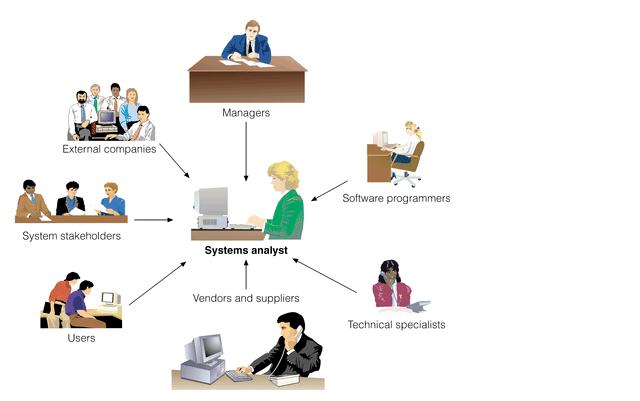Who is Systems Analyst?
A systems analyst is a person who conducts a study, identifies activities and objectives and determines a procedure to achieve the objectives. Designing and implementing systems to suit organizational needs are the functions of the systems analyst He plays a major role in seeing business benefit from computer technology. The analyst is a person with unique skills. He uses these skills to coordinate the efforts of different type of persons in an organisation to achieve business goals.
What a Systems Analyst does?
A system analyst carries out the following job:
- The First and perhaps most difficult task of systems analyst is problem definition. Business problems are quite difficult to define. It is also true that problems cannot be solved until they are precisely and clearly defined.
- Initially a systems analyst does not know how to solve a specific problem. He must consult with managers, users and other data processing professionals in defining problems and developing solutions. He uses various methods for data gathering to get the correct solution of a problem.
- Having gathered the data relating to a problem, the systems analyst analyses them and thinks of plan to solve it. He may not come up personally with the best way of solving a problem but pulls together other people’s ideas and refines them until a workable solution is achieved.
- Systems analysts coordinate the process of developing solutions. Since many problems have number of solutions, the systems analyst must evaluate the merit of such proposed solutions before recommending one to the management
- Systems analysts are often referred to as planners. A key part of the systems analyst’s job is to develop a plan to meet the management’s objectives.
- When the plan has been accepted, systems analyst is responsible for designing it so that management’s goal could be achieved. Systems design is a time consuming, complex and precise task.
- Systems must be thoroughly tested. The systems analyst often coordinates the testing procedures and helps in deciding whether or not the new system is meeting standards established in the planning phase.
Attributes of an effective Systems Analyst
Systems analyst must have the following attributes:
- Knowledge of people: Since a systems analyst works with others so closely, he or she must understand their needs and what motivates them to develop systems properly.
- Knowledge of Business functions: A systems analyst must know the environment in which he or she works. He must be aware of the peculiarities of management and the users at his installation and realize how they react to systems analyst. A working knowledge of accounting and marketing principles is a must since so many systems are built around these two areas. He must be familiar with his company’s product and services and management’s policies in areas concerning him.
- Knowledge of Data processing principles: Most systems today are computer based. The systems analyst must fully aware about the potential and limitations of computers.
- Ability to communicate: As a coordinator, a systems analyst must communicate properly with people of different levels within an organisation. Systems analyst must listen carefully to what others say and integrate the thoughts of others into the systems development process.
- Flexibility: Systems analysts must be flexible in their thinking since they often do not get-their own way. Different factions in an organisation have conflicting needs and most systems are the result of compromise. The analyst’s goal is to produce the system that will be the best for the organisation. This requires an open mind and flexibility in his ideas.
- An analytical mind: It takes an unusual person to see through problems facing an organisation and develop solutions that will work. Systems analysts often find themselves with more data than they can cope with. It requires an analytical mind to select pertinent data and concentrate on them in defining problems and forming solutions.
- Well educated with sharp mind: Systems analysts are called upon to work with people at all levels virtually in every aspect of business. They must know how to work with all of them and gain their confidence. Analysts must have sharp mind to learn quickly how people do their jobs and develop ways for them to do it better.

This is very good.thanks for sharing